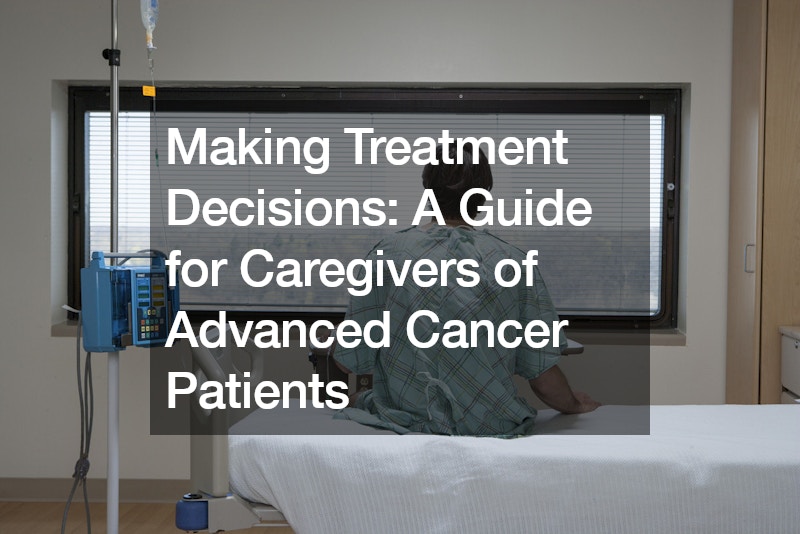
Caring for a loved one facing advanced cancer is a deeply emotional and challenging experience. As a caregiver, you are tasked with supporting your loved one through treatment decisions, providing comfort, and ensuring their well-being. This article will explore the challenges caregivers face when making treatment decisions and provide practical tips for overcoming them with resilience.
Shifting Roles and Responsibilities
One of the most significant challenges caregivers face is the shifting nature of their roles and responsibilities. As the patient’s condition changes, so too do the demands of caregiving.
Tasks that were once simple may become more complex, and caregivers must adapt to meet the evolving needs of their loved ones. This adaptation requires flexibility, patience, and a deep commitment to providing the best possible care.
When considering treatment options, caregivers play a crucial role in advocating for their loved one’s wishes and preferences. It’s essential to involve the patient in decision-making discussions and ensure that their voice is heard. In some cases, new treatment options may become available, offering hope for improved outcomes or symptom management. However, these decisions must be made in the context of the patient’s goals and values, with the guidance of their healthcare team.
Exploring Palliative Care
Palliative care is a vital component of the caregiving journey for patients with advanced cancer. Unlike hospice care, which is focused on end-of-life support, palliative care aims to alleviate the physical and emotional symptoms associated with serious illness. Palliative care professionals are trained to manage treatment side effects effectively, providing an extra layer of support for both patients and caregivers. They work closely with patients and their families to provide personalized care and support, helping them overcome the challenges of living with advanced cancer while maintaining dignity and comfort. By integrating palliative care into the treatment plan, caregivers can enhance the patient’s overall quality of life.
Advance Care Planning
Advance care planning is a proactive process that enables patients to outline their preferences for future medical care, ensuring their wishes are honored even if they are unable to communicate them directly. This involves creating advance directives such as a living will and a durable power of attorney for healthcare.
Caregivers play a crucial role in facilitating these discussions, helping ensure that the patient’s wishes are clearly documented and respected. By engaging in advance care planning, caregivers can help alleviate uncertainty and ensure that medical decisions align with the patient’s values and beliefs. This not only provides peace of mind for patients and their families but also allows for a more personalized approach to care, enhancing the patient’s quality of life and dignity throughout their journey with advanced cancer.
Supporting Self-Care
Amidst the demands of caregiving, it’s essential for caregivers to prioritize their own well-being. Caring for someone with advanced cancer can be physically and emotionally taxing, and neglecting self-care can lead to burnout and exhaustion. Building a strong support network is crucial, allowing caregivers to share their experiences, seek assistance when needed, and find solace in the company of others.
In addition to seeking support from various resources such as support groups and community organizations, caregivers can also explore various self-care practices to manage stress and maintain their well-being. Engaging in regular physical activity, such as walking, yoga, or meditation, can help alleviate stress and improve mood. Setting boundaries and scheduling regular breaks can prevent burnout and ensure caregivers have time for relaxation and personal activities. Prioritizing healthy eating habits and adequate sleep are also crucial aspects of self-care that can enhance resilience and energy levels.
Navigating the Healthcare System
The healthcare system can be complex and overwhelming, especially for caregivers of patients with advanced cancer. Caregivers should familiarize themselves with available resources and support services, including home healthcare providers, social workers, and patient navigators. These professionals can offer guidance on managing medical bills, accessing community resources, and addressing emotional needs. Additionally, caregivers should communicate regularly with the patient’s healthcare team, advocating for their needs and seeking clarification on treatment options and recommendations.
Caregivers can also find invaluable support and guidance from hospice nurses. These dedicated professionals are well-versed in the intricacies of end-of-life care and can provide essential assistance to caregivers of patients with advanced cancer. A hospice nurse offers a wealth of knowledge on symptom management, pain relief, and emotional support, helping caregivers deal with their loved one’s condition confidently and compassionately.
In Summary
Caring for a loved one with advanced cancer is a profound and challenging experience. By actively engaging in treatment decisions, advocating for their loved one’s needs, and prioritizing self-care, caregivers can navigate this journey with compassion and resilience.
.





